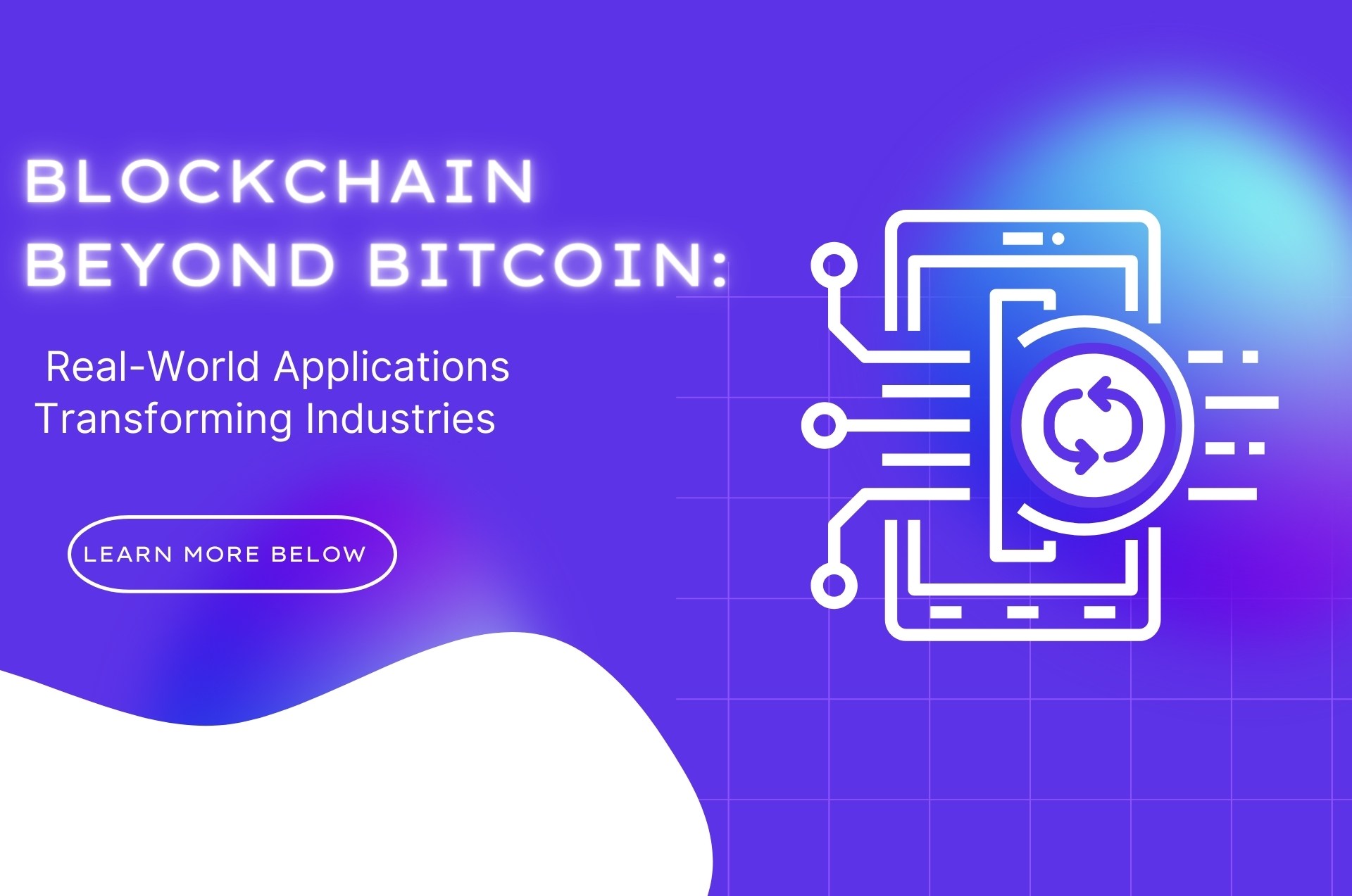
Blockchain Beyond Bitcoin: Real-World Applications Transforming Industries
Blockchain technology, often associated with cryptocurrencies like Bitcoin, is not limited to digital currency applications. Its decentralized and immutable nature presents numerous opportunities for innovation across various industries. In this section, we'll explore the fundamentals of blockchain technology before delving into its real-world applications. But first let's understand what blockchain is all about. Imagine it as a digital notebook where transactions are written. These transactions aren't stored in one place, but across a network of computers. Each new transaction is added to the previous one, forming a chain of blocks. And guess what? Once a transaction is written, it's tough to change it. That's because everyone in the network can see it, making it super secure.
Blockchain Basics:
At its core, blockchain serves as a distributed ledger system that records transactions securely across a network of computers. Unlike traditional centralized systems, where data is stored in a single location controlled by a central authority, blockchain distributes data across multiple nodes or computers. Each transaction is encrypted and stored in a block, and these blocks are linked together in a chronological chain, forming a tamper-proof record of data.
Decentralization:
One of the key features of blockchain is decentralization. In a decentralized network, there is no single point of control or failure. Instead, data is distributed across multiple nodes, making it resistant to censorship and manipulation. This decentralized architecture enhances transparency, security, and trust in the system, as no single entity has control over the entire network.
Immutability:
Another essential aspect of blockchain is immutability. Once a transaction is recorded on the blockchain, it cannot be altered or deleted. Each block contains a unique cryptographic hash of the previous block, creating a chain of blocks that are linked together. Any attempt to tamper with a block would require changing all subsequent blocks in the chain, making it practically impossible to alter historical transactions without detection.
Consensus Mechanisms:
Blockchain networks rely on consensus mechanisms to validate and add new transactions to the ledger. These mechanisms ensure agreement among network participants regarding the validity of transactions. Common consensus mechanisms include Proof of Work (PoW), Proof of Stake (PoS), and Delegated Proof of Stake (DPoS), each with its own advantages and limitations.
Security:
Blockchain technology employs cryptographic techniques to secure transactions and data on the network. Public-key cryptography enables users to verify their identity and digitally sign transactions, ensuring authenticity and integrity. Additionally, cryptographic hashing algorithms ensure that data stored on the blockchain remains tamper-proof and immutable.
Applications of Blockchain Technology:
Now that we have a basic understanding of blockchain technology, let's explore its real-world applications across various industries:
Supply Chain Management:
Blockchain technology is revolutionizing supply chain management by introducing unprecedented levels of transparency, traceability, and efficiency. By recording every step of the supply chain process on a blockchain, stakeholders can track the movement of goods from their origin to the end consumer in real-time. This transparency not only mitigates risks such as fraud, counterfeiting, and errors but also ensures product authenticity and quality. With blockchain, supply chain participants can access accurate and reliable information, enabling faster decision-making and streamlined operations.
Healthcare:
In the healthcare industry, blockchain technology is transforming data management and patient care. Electronic health records (EHRs) stored on a blockchain ensure the security and integrity of sensitive medical information, protecting patient privacy and reducing the risk of data breaches. Patients have greater control over their health data, allowing for secure sharing with healthcare providers, researchers, and insurers. Additionally, blockchain facilitates drug traceability, enabling the tracking of pharmaceuticals throughout the supply chain to prevent counterfeit medications from entering the market.
Finance and Banking:
Beyond its association with cryptocurrencies, blockchain technology is disrupting traditional financial services, offering faster, cheaper, and more secure transactions. Blockchain-powered smart contracts automate and enforce agreements without the need for intermediaries, reducing costs and processing times. Moreover, blockchain-based platforms enable cross-border payments, remittances, and microlending, providing financial inclusion for unbanked populations worldwide. By leveraging blockchain technology, financial institutions can enhance operational efficiency, improve security, and expand their service offerings to a broader customer base.
Intellectual Property Protection:
Blockchain technology provides a secure and transparent platform for protecting intellectual property rights. Creators such as artists, musicians, writers, and inventors can timestamp their creations on a blockchain, establishing immutable records of ownership. This enhances copyright protection and facilitates fair compensation for creators in the digital age. With blockchain, intellectual property rights can be securely managed and enforced, fostering creativity and innovation while preventing unauthorized use and infringement.
Voting Systems:
Blockchain technology holds the potential to revolutionize voting systems by ensuring transparency, security, and integrity in elections. Blockchain-based voting platforms offer immutable records of voter participation, eliminating the risk of tampering or fraud. This enhances voter trust and turnout while enabling remote and decentralized voting options. By leveraging blockchain technology, governments can modernize electoral processes, reduce administrative burdens, and enhance democratic participation.
Blockchain technology is not just about cryptocurrencies like Bitcoin; it's a transformative force that is reshaping industries and revolutionizing traditional processes. From supply chain management to healthcare, finance, intellectual property protection, and voting systems, blockchain's decentralized and immutable nature offers unprecedented transparency, security, and efficiency. While challenges remain, the potential for blockchain to drive innovation and create positive societal impact is undeniable. As organizations and governments continue to explore its applications, we are witnessing the dawn of a blockchain-powered future.






(9) Comments
Karin
May 12, 2024HOW TO RECOVER YOUR LOST OR STOLEN FUNDS crypto/ binary / Real estate investment recovery You should gather and document all relevant details about the theft, such as transaction IDs, wallet addresses, and any communication with the scammer if any, and then proceed to message kevinlorand02@gmail.com to get back your lost/ stolen funds by sharing the evidence you've compiled. She was the only one who was able to recover my funds I was so surprised she got back my money worth $55k but glory be to God and all thanks to Her
Linda
May 12, 2024So many people put up adverts and recommendations every minute online about who you should work with and you have done that severally but you keep losing your money. Why don't you learn how to trade binary options crypto currencies Forex and work for yourself and stop losing to scammers and their sugar coated adverts. If you need an assistance with regards of your lost funds from your broker or maybe your broker manager asking you to make more deposit before you could make a withdrawal or your account has been manipulated by your broker manager or your broker has blocked your account just because they need you to make more deposit to your account.Kindly get in contact with Mrs Trish on her mail (trishflora2@gmail.com) for more info and special guidelines
Kelvin Gift
July 15, 2024SACLUX COMPTECH SPECIALST NEVER DISAPPOINT This happened to me recently someone got my wallet hacked and my BTC was stolen, I contacted 2 tech but they took my money.This might had Happened To you or IF anyone or someone you know has been scammed, it is crucial to notify the proper authorities as soon as possible to help to recover lost funds and to prevent others from being victimized. Just After many trials , I Hired SACLUX COMPTECH SPECIALST They Investigated,Track and traced it back to the wallet where my BTC went through. I thought that was the end but fortunately for me, I got it back real quick with the help of (sacluxcomptechspecialst@engineer.com) He is legit and very diligent with his work. Hire their service & Thank me late Website: https://sacluxcomptechspecialst.com/ Telegram: SacluxComptechTeam
ford smith
July 24, 2024I never thought I would fall victim to a crypto scam until I was convinced of a crypto investment scam that saw me lose all my entire assets worth $487,000 to a crypto investment manager who convinced me I could earn more from my investment. I thought it was all gone for good but I kept looking for ways to get back my stolen crypto assets and finally came across Superiro Hack Recovery, a crypto recovery/spying company that has been very successful in the recovery of crypto for many other victims of crypto scams and people who lost access to their crypto. I’m truly grateful for their help as I was able to recover my stolen crypto assets and get my life back together. I highly recommend their services EMAIL SUPERIOR.HACK@GMAIL.COM or whatsapp +14106350697
ford smith
July 24, 2024I never thought I would fall victim to a crypto scam until I was convinced of a crypto investment scam that saw me lose all my entire assets worth $487,000 to a crypto investment manager who convinced me I could earn more from my investment. I thought it was all gone for good but I kept looking for ways to get back my stolen crypto assets and finally came across Superiro Hack Recovery, a crypto recovery/spying company that has been very successful in the recovery of crypto for many other victims of crypto scams and people who lost access to their crypto. I’m truly grateful for their help as I was able to recover my stolen crypto assets and get my life back together. I highly recommend their services EMAIL SUPERIOR.HACK@GMAIL.COM or whatsapp +14106350697
Paul Becker
August 23, 2024If you're not familiar with cryptocurrency trading, I strongly advise you to either stay away from it completely or invest very cautiously. I was forced to invest a significant amount of my life savings on a forex platform to increase my profits, but I ultimately lost roughly 95,000 USD to this investment scam. I was not allowed to take my money out after I had invested and made a profit. I sent a letter to customer service, but it was ineffective, so I realized I had been duped. I was fortunate enough to come across a genuine deal retrieval WEB WIZARD after much looking for ways to acquire assistance. I decided to give it a shot and explained my condition to them. they gave me their word that they would help me get my money back. Honestly, they performed a fantastic job, and my money was recovered in my wallet in less than 24 hours without any upfront payment. I appreciate having encountered WEB WIZARD with such exceptional abilities, it's truly remarkable. TELEGRAM: @BestwebwizardRecovery WHATSAPP: +1(580) 2801390 EMAIL: bestwebwizardrecovery@consultant.com OR: info@bestwebwizrecovery.com WEBSITE: https://bestwebwizrecovery.com/
James Blood
August 26, 2024Have you lost hope of ever recovering your money from scam brokers or platform ?? I have good news for you and yes it is 97% possible for you to recover your money through the help of Gavin ray a recovery specialist ,I lost over €176,000 to fake European broker after paying several fees I didn’t get back my profit and I lost all hope of ever making profit through binary trading until I came across a post online about his Private Hacking and Certified Binary Recovery services i decided to give him a try and i was able to recover my money with his amazing recovery team guidance You can contact him on mail gavinray78 gmail com or WhatsApp +1 352322 2096
Elizabeth J. Petrin
October 07, 2024I've read numerous stories of individuals losing bitcoin through fraud. I prefer to start by stating that the organisations in charge of bitcoin security have done nothing to assist in the recovery of lost or stolen coins. In my case, my computer was hacked and someone with access to my emails stole 4.3 bitcoins. I contacted blockchain right away, but they wasted my time. I then looked for help elsewhere and was directed to speak with a bitcoin professional who helped hunt down and recover my bitcoins for a charge. After the job was finished, I was more than happy to pay more. I'm glad I got help, and I want to urge you to contact recoveryhacker101@gmailcom.
FUNDS RECOVERY EXPERT
February 19, 2025🔲 🔲 **FUNDS RECOVERY **🔲 🔲 ⬛️ **HAVE YOU FALLEN VICTIM TO A FRAUDULENT INVESTMENT SCHEME, CRYPTO SCAM Or OTHER TYPES OF SCAMS???** ⬛️ Are you struggling to get back the money you lost? You’re not alone. Every day, countless individuals face the devastating impact of scam operations that drain their hard-earned savings. But there’s good news – we are here to help you recover what’s rightfully yours. ⬛️ Truth be told, the only Specialists that is capable of retrieving your lost funds from online scams, fraud and scam investment websites are Team of PROFESSIONAL HACKERS & CYBER FORENSIC EXPERTS, we are the Funds Recovery Expert who knows various Retrieval Techniques and Strategies that suits different scenarios of Scam ⬛️ At Funds Retrieval Panel, we specialize in Funds Recovery using advanced technology with the help of our Top notch hackers and cyber forensic experts that works cooperatively with the use of various Advanced technology softwares, hardwares and AI’s to retrieve your funds from fraudulent investments, crypto scams, and malicious online schemes. With years of experience in the financial and tech sectors, we are the trusted solution for individuals looking to recover lost money. ⬛️ We don’t just promise results – we deliver them. Our expert team has successfully recovered Billions of dollars for clients who have fallen victim to scams ⬛️ CONTACT US NOW to schedule your free consultation and start the process of recovering your funds. 🌍 www.fundsretrievalpanel.com 🌍 📩 info@fundsretrievalpanel.com✉️